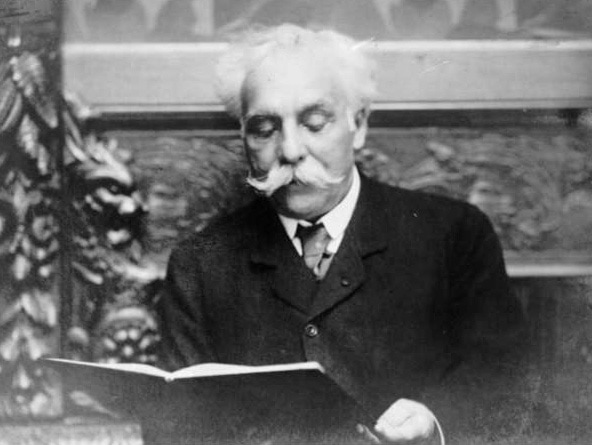
Gabriel Fauré Quotes
Gabriel Fauré was a French composer, organist, pianist and educator. He was one of the most well-known French composers of his generation, and his musical style influenced composers to come.
His best-known works are Pavane, Requiem, Sicilienne, “Après un rêve” and “Clair de lune”. Towards the end of his life he started to go deaf and his works in the last twenty years sound very different from his earlier works.
Image: Composer Gabriel Fauré reading compositions
“After allowing the lessons to run over, [Camille Saint-Saëns] would go to the piano and reveal to us those works of the masters from which the rigorous classical nature of our program of study kept us at a distance and who, moreover, in those far-off years, were scarcely known. …At the time, I was 15 or 16, and from this time dates the almost filial attachment… the immense admiration, the unceasing gratitude I have had for him, throughout my life.”
“[Music is] a language belonging to a country so far above all others that it is dragged down when it has to express feelings or individual traits that belong to any particular nation.”
“The criticisms of my music have been that it’s a bit cold and too well brought up! There’s no question about it; French and Germany are two different things.”
“Mozart’s music is particularly difficult to perform. His admirable clarity exacts absolute cleanness: the slightest mistake in it stands out like black on white. It is music in which all the notes must be heard.””The criticisms of my music have been that it’s a bit cold and too well brought up! There’s no question about it; French and Germany are two different things.”
Charles Koechlin, in Le Ménestral (1921); reproduced in “Music in the Foreign Press: Gabriel Fauré’s Individuality” by M. D. Calvocoressi, in The Musical Times (July 1st, 1921):
“Fauré sets to French musicians a matchless example of sincerity and genuineness. Neither following fashion nor listening to would-be advisers, he proceeded untrammelled in his quest for beauty. He remained simple, combining impassioned imagination and lucidity of mind. When one listens to his music one always feels secure that an apex is reached, that here is perfection. In the beautiful proportions of his music, a great lesson is embodied—a lesson that has never been more needful than now, when the younger French school is so deeply thrilled by the innovations of Schönberg, Stravinsky, and Bartók. The main features of French art at its best are continuity and perspicuity.”
Leslie Orrey said about Fauré:
“More profound than Saint-Saëns, more varied than Lalo, more spontaneous than d’Indy, more classic than Debussy, Gabriel Fauré is the master par excellence of French music, the perfect mirror of our musical genius.”